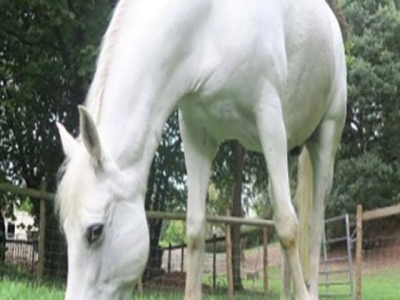Study to investigate genetics of tying-up in horses, ponies

While many forms of tying-up appear to have genetic component, gene or genes causing the disease have not yet been identified.
Recurrent exertional rhabdomyolysis (RER) in horses is an exercise-associated disease that involves repeated episodes of muscle damage, according to an announcement from the Royal Veterinary College (RVC) in the U.K.
The disorder is also sometimes known as tying-up, azoturia, setfast, Monday-morning disease or just rhabdomyolysis. The disease can be recognised by the clinical signs (which vary in severity) but can include muscle spasms or muscle trembling, stiffness or hard muscles, high heart rate, sweating, muscle pain, reluctance to move or recumbency, red-brown urine (myoglobinuria) and, in severe cases, even death, RVC said. Often, a vet will confirm the diagnosis with a blood sample and sometimes also a muscle biopsy sample.
While there appears to be a genetic component to many forms of RER, the gene or genes causing the disease have not yet been identified, RVC said. There is also currently no cure for this disorder, although many horses can continue to perform well if managed appropriately. The disorder is often recognized in racing Thoroughbreds, but a variety of other breeds are also diagnosed with RER.
RVC researchers are investigating the genetics of exertional rhabdomyolysis in horses to identify predisposing genetic risk factors and possible novel therapeutic targets, the announcement said.
It is thought that the severity of the clinical signs seen in RER cases might be associated with different specific genetic changes, and it is hoped that specific patterns of clinical signs can be identified in different breeds that might be associated with some of these genetic changes, RVC said.
Most relevant research so far has been done in Thoroughbreds, but the new study will look at other breeds that are popular in the U.K., specifically warmblood horses and Connemara ponies.
The study will look at samples from two sets of horses/ponies within a 25-mile radius of RVC's Hertfordshire campus:
1. Warmblood horses and fully registered Connemara ponies over the age of eight with no history of tying-up or other muscle-related diseases. These animals will be control subjects and are an important part of the study.
2. Breeds as above that have tied up with exercise at least twice, as confirmed by blood testing by a veterinarian.
A cheek swab (for DNA testing) will need to be taken, and owners will be asked to complete a questionnaire regarding each horse’s diet, exercise regime, breeding and clinical history in order to dissect genetic, lifestyle and environmental factors. The results of this profile will be shared with the owner.
Có thể bạn quan tâm
 Mobile app updated to estimate horse bodyweight
Mobile app updated to estimate horse bodyweight University of Minnesota faculty launches updated, first-of-its-kind mobile app.
 Land purchase paves way for Idaho research dairy
Land purchase paves way for Idaho research dairy Idaho State Board of Education vote advances University of Idaho plan to create nation's largest research dairy.
 Webinar to explore heritability of cattle water intake
Webinar to explore heritability of cattle water intake Great Plains Grazing will host a free webinar Feb. 19 on cattle water intake.